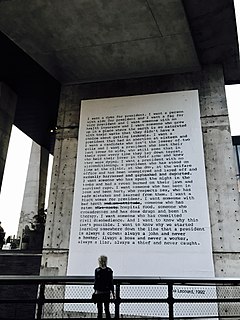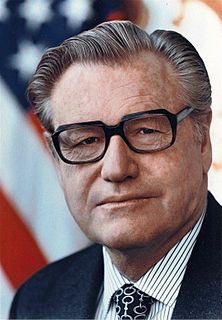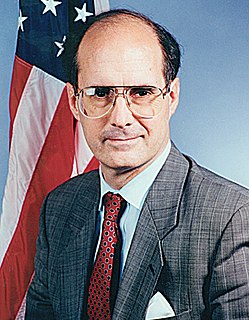A Quote by Richard A. Falk
There was a deliberate decision after the failure of the League of Nations to make the next attempt to establish a global political actor sensitive to geopolitical realities. The underlying idea was to provide major states, defined in 1945 by reference to the winners in the Second World War (now an anachronism), with assurance that they could take part in the UN without jeopardising their national interests. In this regard, the UN has succeeded, as none of the big countries has withdrawn, and the Organisation has managed to achieve virtually universal membership of all sovereign states.
Quote Topics
Achieve
Actor
After
Anachronism
Assurance
Attempt
Big
Could
Countries
Decision
Defined
Deliberate
Establish
Failure
Geopolitical
Global
Idea
Interests
League
League Of Nations
Major
Make
Membership
National
National Interest
National Interests
Nations
Next
None
Now
Organisation
Part
Political
Provide
Realities
Reference
Regard
Second
Second World War
Sensitive
Sovereign
States
Succeeded
Take
Underlying
Universal
Virtually
War
Winners
Without
World
World War
Related Quotes
The cry of "Make America Great Again" reflects accurately that, after the fall of the Soviet Union, the sole superpower status of the United States is coming to an end. For the first time since the second World War, we are not the sole dominant economy in the world. In large part this is because of the success of policies followed by the United States to create an environment, a peaceful period in history in which economies could grow and countries could benefit.
As matters now stand, the veto seems inappropriate, given the absence of any deep ideological split between major states, and definitely constrains the war-prevention mission of the UN. Similarly, the present permanent five are out of touch with geopolitical realities, and constitute a remnant of a West-centric world order, casting a shadow of illegitimacy across the activities of the most important organ of global policymaking in the UN System.
Actually, the phrase "national security" is barely used until the 1930s. And there's a reason. By then, the United States was beginning to become global. Before that the United States had been mostly a regional power - Britain was the biggest global power. After the Second World War, national security is everywhere, because we basically owned the world, so our security is threatened everywhere. Not just on our borders, but everywhere - so you have to have a thousand military bases around the world for "defense."
The United Nations is the preeminent institution of multilateralism. It provides a forum where sovereign states can come together to share burdens, address common problems, and seize common opportunities. The U.N. helps establish the norms that many countries - including the United States - would like everyone to live by.
I think, while it is true that the Hillary Clinton and I voted differently on the war in Iraq, what is important is that we learn the lesson of the war in Iraq. And that lesson is intrinsic to my foreign policy if elected president, is the United States cannot do it alone. We cannot be the policeman of the world. We are now spending more I believe than the next eight countries on defense. We have got to work in strong coalition with the major powers of the world and with those Muslim countries that are prepared to stand up and take on terrorism.
The Constitution, when it says, "We, the people of the United States, in order to form a more perfect union, establish justice, ensure domestic tranquility, provide for the common defense, promote the general welfare, and secure the blessings of liberty to ourselves and our posterity, do ordain and establish this Constitution for the United States of America," meant just what it said without reference to color or condition, ad infinitum.
After the First World War, it was, like, let's form the League of Nations, we have to learn to work together. It's the only way we're going to survive. And now it's like we're undoing these very fragile institutions that were built after the First and Second World Wars that were about nations working on a kind of global diplomacy for our mutual benefit. And we're undoing them at such rapid-fire pace.
I have ever deemed it fundamental for the United States never to take active part in the quarrels of Europe. Their political interests are entirely distinct from ours. Their mutual jealousies, their balance of power, their complicated alliances, their forms and principles of government, are all foreign to us. They are nations of eternal war.
This issue of expanding the reach of international criminal law by reliance on the use of Universal Jurisdiction by domestic courts needs to be balanced against the injustice of according impunity to those with strong geopolitical backing. It is notable that several western European countries backtracked on UJ after threats of retaliatory moves by the United States and Israel. There is no doubt that the domain of UJ is a geopolitical battleground.
The United Nations, he told an audience at Harvard University, 'has not been able-nor can it be able-to shape a new world order which events so compellingly demand.' ... The new world order that will answer economic, military, and political problems, he said, 'urgently requires, I believe, that the United States take the leadership among all free peoples to make the underlying concepts and aspirations of national sovereignty truly meaningful through the federal approach.'
With the decline of American interests in the outcome of this region, there is no glue holding it together. And the countries in this region are invented ... The last guarantor of the region's borders was the United States, and the US has basically said "the hell with it." What you're really having is the collapse of nation-states because they're not nations. They're only states.
We are living in a world where major states and large geopolitical projects have to prove their competitive edge. It is clear, as well, that with regard to the intensifying American-Chinese confrontation and the inert power of a united Europe, Russia has to make up its mind - because it is losing ground as an independent center of power.

































